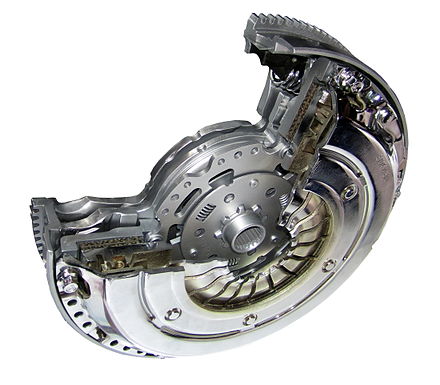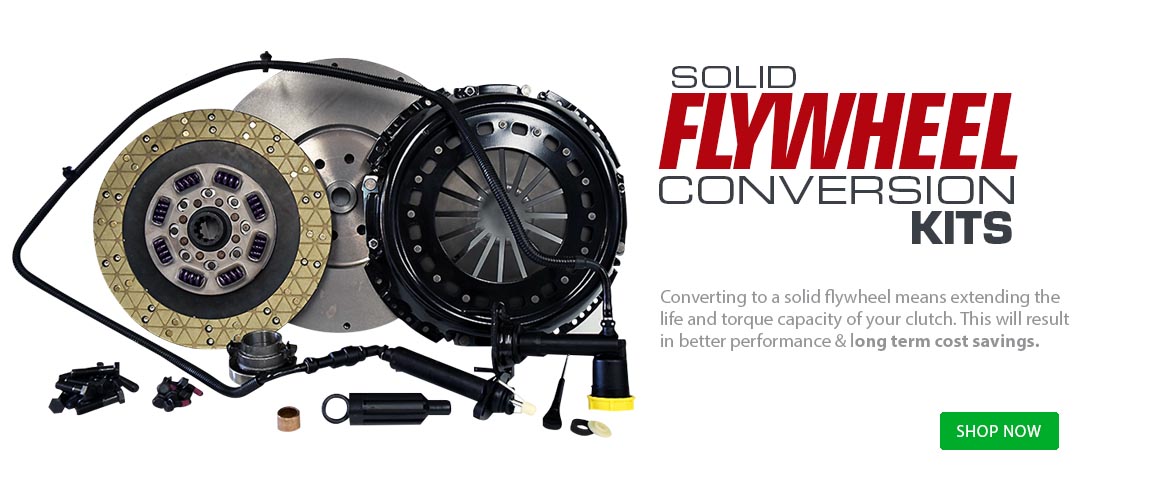
A dual mass flywheel is made up of these separate parts:
1. Primary Flywheel
2. Secondary Flywheel
3. Arc Damper Spring
4. Friction Torque Limiter
5. Ring Gear
The primary and secondary flywheels are connected by springs. A dual mass flywheel actually dampens excessive vibrations from the engine, which are most noticeable at idle. Dual mass flywheels also provide a smoother transfer of power. If you have excessive rattles and noises coming from the flywheel unit, that almost always means that the dual mass flywheel is starting to fail.
Here’s what to do when your dual mass flywheel is noisy and rattling.
Causes of DMF Failure
If you notice a rattle or vibration when driving, and the clutch seems to slip in the higher gears, but you do not smell burning friction material, you're dual mass flywheel is failing. Beyond normal wear and tear, there’s other things that can cause a DMF to fail -- these include:
Driving Habits: The cause of a failing dual mass flywheel may have something to do with your driving habits. Driving in too high of a gear, engine misfires, uneven running caused by a cylinder to cylinder imbalance, low compression in one cylinder causing engine imbalance, rough or difficult starting issues, slow cranking speeds, towing heavy loads, are typical sources of problems.
Performance Upgrades: One of the easiest ways to "kill" a dual mass flywheel is to increase engine torque. Engine tuners, water/methane injection kits, and other various performance upgrades all lead to greater engine torque. Since the damper springs are designed for a specific torque output, increased torque will eventually lead to a dual mass flywheel failure.
Overheating: Check the secondary flywheel for blue colored areas or heat cracks to indicate overheating — this is caused by excessive clutch slip.
What to Do When the Dual Mass Flywheel is Bad
When you have identified flywheel damage/failure, you’re faced with two different options to “fix” the problem:
1. Replacement
2. Conversion
NOTE: Dual Mass Flywheels are not designed to be resurfaced. They must be discarded and replaced. The reason is that contaminants introduced by surface grinding effect the performance of internal components and quickly result in DMF failure.
Replacement: If your vehicle has remained completely stock and you've driven over 100,000 miles on the original components, an OE-spec DMF replacement is a reasonable choice. Just understand that any future performance modifications will reduce the lifespan of the flywheel.
NOTE: If you've got a vehicle with performance modifications, do not replace the dual mass flywheel with another OE-spec dual mass flywheel, as it will only lead to another premature failure. Either convert to a single mass flywheel, or remove the performance upgrades so an OE-spec flywheel will last.
Conversion from Dual Mass to Single Mass: If your dual mass flywheel has failed, and it's because your vehicle has been modified and/or is used for racing, towing, etc., conversion is the best plan. The main benefits to converting from a dual mass unit to a single mass unit are:
- Single mass units are easy to machine/resurface, which means you don't automatically have to buy a new dual mass unit if you replace the clutch.
- Single mass units are lighter and have a faster response time, leading to better clutch performance.
- Most importantly, single mass units are less expensive and more reliable than dual mass units (substantially so).
If single mass conversion kits have a downside, it's that they tend to make your vehicle's gear box a bit noisier at idle in neutral. This noise sounds like a rattle or whine coming from the gear box, and it's commonly referred to as "gear rollover noise" or "gear rattle." While it may seem counter-intuitive, this noise is not a symptom of a problem. The noise is a natural consequence of the vehicle design. Specifically:
- Most vehicle engines are not perfectly balanced. This imbalance is most noticeable at idle, and it causes a vibration in the vehicle's gearbox.
- All of the metal gears in the gear box have gaps between them, and they can therefore "rattle" in these gaps. The gaps are intentional, as they accommodate the natural thermal expansion of the gears.
Depending on the vehicle, it's often possible to reduce or eliminate "gear rattle" with an additive (Lucas Automatic Transmission Fluid Fix can be added to your gear oil to thicken it and eliminate the gear rattle noise).
Here at Phoenix Friction, we highly recommend converting to a single mass flywheel when you have made performance modifications to your vehicle, frequently haul, or frequently tow. Solid flywheels are extremely reliable and our conversion kits require no modifications during installation.

Check out our selection to find the flywheel that’s best for your application, or give us a call at 877-570-5630.